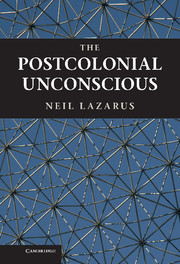Book contents
- Frontmatter
- Contents
- Acknowledgements
- Introduction: The political unconscious of postcolonial studies
- 1 The politics of postcolonial modernism
- 2 Fredric Jameson on ‘Third-World Literature’: a defence
- 3 ‘A figure glimpsed in a rear-view mirror’: the question of representation in ‘postcolonial’ fiction
- 4 Frantz Fanon after the ‘postcolonial prerogative’
- 5 The battle over Edward Said
- Notes
- Works cited
- Index
5 - The battle over Edward Said
Published online by Cambridge University Press: 05 June 2012
- Frontmatter
- Contents
- Acknowledgements
- Introduction: The political unconscious of postcolonial studies
- 1 The politics of postcolonial modernism
- 2 Fredric Jameson on ‘Third-World Literature’: a defence
- 3 ‘A figure glimpsed in a rear-view mirror’: the question of representation in ‘postcolonial’ fiction
- 4 Frantz Fanon after the ‘postcolonial prerogative’
- 5 The battle over Edward Said
- Notes
- Works cited
- Index
Summary
Edward Said spoke quite often of the ‘politics of interpretation’, intending thereby to draw attention both to the ‘interestedness’ (a term that, as far as I know, he did not use, deriving from the tradition of ideology critique) and to the materiality, or ‘worldliness’ (very much his word), of ideas and knowledge production. However, the phrase might with justification be applied to his own work, for reading Said has always been a political exercise. Since at least the mid 1970s, there has been intellectually heated and ideologically charged dispute and disagreement over the substance, tendency, and bearing of his work.
One dimension of this conflict has been ‘political’ in the quite conventional sense, of course, since much of Said's work bore on public affairs and addressed state policy and international relations. As Michael Sprinker noted in introducing a Critical Reader on him in 1992,
[Said] has for more than twenty years been the most visible spokesperson for the Palestinian cause in the United States (more recently in Britain as well). As journalist, television pundit, and essayist, he has tirelessly contested the standard caricature of the politically engaged Arab as terrorist, barbarian, maniac. Urbane and charming, he presents a totally different image of Arabs to an Anglophone audience accustomed only to seeing them in the guise of gun-toting kidnappers and hijackers.
Already considerable by 1992, Said's prominence as a dissenting public intellectual expanded exponentially in the decade between that date and his untimely death in 2003.
- Type
- Chapter
- Information
- The Postcolonial Unconscious , pp. 183 - 203Publisher: Cambridge University PressPrint publication year: 2011



